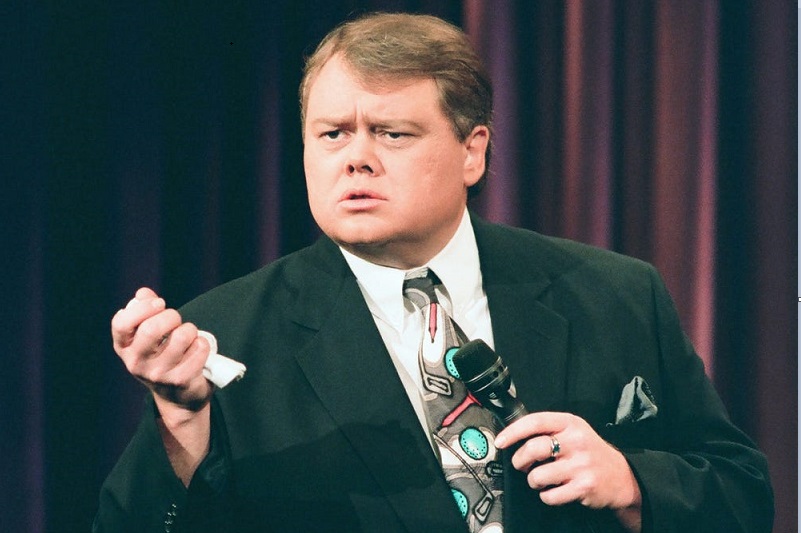Louis Anderson, the stand-up comedian whose success led a film and television career that would earn him three Emmy Awards, died today in Las Vegas at the age of 68. The cause was complications from diffuse large B cell lymphoma, which he had entered the hospital to treat earlier this week. In a period where a number of beloved celebrities have passed away, this is one that especially hurts because the kind of gentle, self-deprecating and ultimately healing form of humor that he specialized in was the sort that audiences young and old could—and did— appreciate in equal measure.
Born in 1953, Anderson was raised in St. Paul, Minnesota, one of eleven children born to Ora Z. and Louis William Anderson, the latter a trumpet player for Hoagy Carmichael whom Anderson would later describe as being abusive and an alcoholic. While working as a counselor for troubled children, Anderson began doing comedy and had his first success in 1981, when he won first place at the Midwest Comedy Competition and was hired as a joke writer for the competition’s host, the legendary Henny Youngman. After performing professionally for a couple of years, he had his big break in 1984 when he made his network television debut on “The Tonight Show,” where his set did so well that Johnny Carson brought him out for a second bow, a seal of approval that was a rarity for most comedians appearing o the show and especially for those making their first appearance.
Following that appearance, Anderson’s stand-up career began to skyrocket as audiences responded to his low-key and hostility-free approach to humor, which stood in marked contrast to that of more abrasive contemporaries such as Sam Kinison. He also began making appearances on other talk shows and comedy showcases and in 1987, he filmed a well-received stand-up special in Minneapolis for Showtime that would be the first of a number of such shows he would do over the years for the network and for HBO.
Around this time, he began making occasional appearances on the big screen, starting with small roles in such films as the “Flashdance”-on-a-bike misfire “Quicksilver” (1986), the popular “Ferris Bueller’s Day Off” (1986) and the bizarre fantasy-drama “Ratboy” (1986). In 1988, he would make what would be his lone appearance as the star of a feature with “The Wrong Boys,” a barely-released comedy in which he played a man who reunited with members of his former Cub Scout pack who get into numerous crazy mix-em-ups when they attempt to remount a failed camping expedition that they tried in their younger days. However, that year would also see him in what would be his most memorable film role as Maurice, one of Eddie Murphy’s co-workers at McDowell’s in the smash hit “Coming to America,” a part that he would return to last year in a cameo in the sequel “Coming 2 America.”
He would find much greater success on television, starting with appearances on shows such as “Remington Steele,” “The Jim Henson Hour” and “Grace Under Fire.” In 1995, he co-created “Life with Louie,” an animated series loosely inspired by his own childhood that ran from 1995-1998. Although not a massive hit, the show, which would show his character, 8-year-old Louie, using humor to deal with issues such as his relationship with his father and teasing over his weight, would become a cult favorite and receive a number of awards, including two for Anderson himself for Outstanding Performer in an Animated Program. A live-action 1996 sitcom, “The Louie Show,” would run for only six episodes but in 1999, he was hired to host a revival of the game show standard “Family Feud,” a position he would hold for three years before being replaced in 2002 with Richard Karn.
For the next few years, Anderson would continue to go between stand-up performances, appearances on television shows that included “Ally McBeal,” “Nash Bridges,” “Scrubs” and “Tom Goes to the Mayor” and penning a couple of books, 2009’s The F Word: How to Survive Your Family and 2018’s Hey Mom: Stories for My Mother, But You Can Read Them Too. (He previously published Dear Dad: Letters from an Adult Child in 1991 and Goodbye Jumbo, Hello Cruel World in 1994.) Perhaps his greatest triumph outside of the world of stand-up came in 2016 when he was cast as Christine Baskets, the mother of identical twins played by Zach Galifinakis on the critically acclaimed FX comedy-drama “Baskets” I realize that the idea of a guy dressing up as a woman is among the hoariest gags in the book but the secret to Anderson’s success in the role was that he did not play her as a one-dimensional joke, but as a real person who inspired laughs from her character and not from the fact that it was a guy in a dress. His performance would win the Emmy for Outstanding Supporting Actor in a Comedy Series in 2016 and he would be nominated again in that category in 2017 and 2018.
In recent years, he would appear on shows like “Drunk History” and “Young Sheldon” and would have recurring roles on “Search Party” and “Twenties.” He also continued to perform onstage, an act that would eventually land him a place on Comedy Central’s list of the 100 Greatest Stand-Up Comedians of All Time. That is a position that no one who professes to know anything about comedy would possibly deny him. He was a man who brilliantly used humor both to make people laugh and to help with the healing process and as much as it hurts to see him go, at least he managed to leave behind a body of work that will allow him to continue to do so for years to come.












